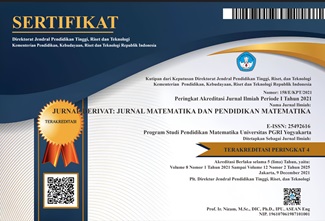Penerapan Quantum Learning Dengan Congklak Daur Ulang Untuk Meningkatkan Kemampuan Kombinatorik Siswa
DOI:
https://doi.org/10.31316/j.derivat.v12i1.7246Abstract
Recycled congklak is a game that is closely related to mathematics, especially probability. The learning model applied is Quantum Learning in the process of learning mathematics. The purpose of this research is to evaluate the effectiveness of Quantum Learning in improving students' combinatorial ability while providing additional benefits in understanding sustainability through the use of recycled congklak game. The use of experimental research method where students are divided into two classes, namely experimental class and control class. The research sample was students of SMPIT Ar-Rahman Islamic School grade IX. The data analysis process used the SPSS application by conducting various pre-requisite analysis tests and the Mann-Whitney Test and comparing the average N gain value of each class. Recycled congklak learning is very helpful for students in understanding mathematical concepts, especially in probability material and has an effect on students' combinatoric abilities. The application of Quantum Learning implemented in the classroom makes students more active and responsive in listening to learning and guidance.
Keywords: recycled congklak, combinatorics skills, probability, quantum learning.
References
Afifah, R. N., Hidayat, R., & Setiyadi, E. B. (2023). Proses Berpikir Kombinatorik Siswa Dalam Menyelesaikan Soal Matematika Ditinjau Dari Self Efficacy. Jurnal Prodi Pendidikan Matematika (JPMM), 5(2), 699–711.
Bel-Ann Ordu, U. (2021). The Role of Teaching and Learning Aids/Methods in a Changing World. New Challenges to Education: Lessons from Around the World, 19, 210–216.
Hariyadi, A., Rasyad, A., S, W. R., N, D. S., & Najikhah, F. (2024). Enhancing Numeracy Skills in Elementary Students through the Traditional Congklak Game : A Study in Kudus. Al-Ishlah: Jurnal Pendidikan, 16(3), 3501–3514. https://doi.org/10.35445/alishlah.v16i3.5613
Jamil, H. (2024). Exploring Innovation in the Development of Teaching Aids among Prospective Teachers for the Implementation of Assessment of Reading Skills. Journal of Public Administration and Governance, 13(4), 110. https://doi.org/10.5296/jpag.v13i4.21601
Marsyanda, D., & Havizul. (2023). Analisis Permainan Tradisional Congklak dalam Pembelajaran Matematika Materi Peluang. Gunung Djati Conference Series, 28, 13–19.
Martini, N. M., Rasna, W., & Artawan, I. G. (2014). Implementasi Model Pembelajaran Quantum Learning dalam Pembelajaran Menulis Karangan Deskripsi Pada Siswa Kelas X SMKN 1 Abang. Program Pascasarjana Universitas Pendidikan Ganesha, 3(1), 21–26.
Melusova, J., & Vidermanova, K. (2015). Upper-secondary Students’ Strategies for Solving Combinatorial Problems. Procedia - Social and Behavioral Sciences, 197(February), 1703–1709. https://doi.org/10.1016/j.sbspro.2015.07.223
Mursyida, M., Gustiningsi, T., & Rohman, R. (2024). Application of the Quantum Learning Model Assisted By Geogebra To Support Student’S Concept Understanding Ability. Prima Magistra: Jurnal Ilmiah Kependidikan, 5(3), 206–213. https://doi.org/10.37478/jpm.v5i3.4296
Nurazizah, K. (2023). Etnomatematika: Meningkatkan Minat dan Pemahaman Matematika melalui Media Permainan Congklak. Jurnal Ilmiah Pendidikan Matematika Al Qalasadi, 7(2), 138–147. https://doi.org/10.32505/qalasadi.v7i2.6793
Rapanca, D., Wibowo, T., & Sapti, M. (2020). Struktur Berpikir Kombinatorik Siswa dalam Menyelesaikan Masalah Matematika. Jurnal Pendidikan Surya Edukasi (JPSE), 6(1), 96–103. https://doi.org/10.37729/jpse.v6i1.6496
Sulistyawati, E., Puspitasari, D., Saidah, Z. N., & Rofiqoh, I. (2021). Manipulative Learning Media Based on Stem (Science, Technology, Engineering, and Mathematics) To Improve Student Learning Outcomes. MaPan, 9(1), 1. https://doi.org/10.24252/mapan.2021v9n1a1
Wahyuni, I., F, L. L. A. I., Nikmatuzzahro, A., & Febiani, D. I. (2023). Analisis Kemampuan Berpikir Kombinatorika Siswa Kelas XII MA Wahid Hasyim Dalam Memecahkan Soal Terapan Materi Peluang Kombinasi. Jurnal Pembelajaran Dan Matematika Sigma (Jpms), 9(1), 218–225. https://doi.org/10.36987/jpms.v9i1.4168
Zenkl, D. (2021). Presentation of combinatorial concepts in mathematics textbooks and its compliance with a concept development theory. Scientia in Educatione, 12(1), 37–52. https://doi.org/10.14712/18047106.1938
Zeybek, G. (2017). An Investigation on Quantum Learning Model. International Journal of Modern Education Studies, 1(1), 16. https://doi.org/10.51383/ijonmes.2017.12
Yuwanto, L. (2019). Metode Penelitian Eksperimen (2nd ed.). Graha Ilmu.
Downloads
Published
Issue
Section
Citation Check
License
Copyright (c) 2025 Satria Purnama Hadi, Jubaeni, Anisa Maulida Tuankotta, Arfatin Nurrahmah

This work is licensed under a Creative Commons Attribution-ShareAlike 4.0 International License.
Authors who publish with this journal agree to the following terms:
-
Authors retain copyright and grant the journal right of first publication with the work simultaneously licensed under a Creative Commons Attribution-ShareAlike 4.0 International License that allows others to share the work with an acknowledgment of the work's authorship and initial publication in this journal.
- Authors are able to enter into separate, additional contractual arrangements for the non-exclusive distribution of the journal's published version of the work (e.g., post it to an institutional repository or publish it in a book), with an acknowledgment of its initial publication in this journal.
- Authors are permitted and encouraged to post their work online (e.g., in institutional repositories or on their website) prior to and during the submission process, as it can lead to productive exchanges, as well as earlier and greater citation of published work (See The Effect of Open Access).







